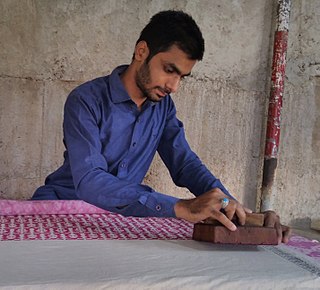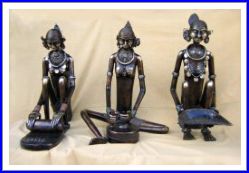
Madhya Pradesh is a state in central India. Its capital is Bhopal, and its largest city is Indore. Other major cities of the state are Jabalpur and Gwalior. Madhya Pradesh is the second largest Indian state by area and the fifth largest state by population with over 72 million residents. It borders the states of Uttar Pradesh to the northeast, Chhattisgarh to the east, Maharashtra to the south, Gujarat to the west, and Rajasthan to the northwest.

A Banarasi sari is a sari made in Varanasi, an ancient city which is also called Benares (Banaras). The saris are among the finest saris in India and are known for their gold and silver brocade or zari, fine silk and opulent embroidery. The saris are made of finely woven silk and are decorated with intricate designs, and, because of these engravings, are relatively heavy.

Phulkari refers to the folk embroidery of the Punjab region and Gulkari of Sindh in South Asia.
Bagh is a census town in Dhar district in the state of Madhya Pradesh, India. It is known for the Bagh Caves, which are late 4th- to 6th-century Buddhist rock-cut chambers with murals. The name of the town stems from the caves - according to local legend there were living tigers in these abandoned Buddhist caves.

The Economy of Madhya Pradesh refers to the economic growth with respect to the Indian state of Madhya Pradesh. It grew 12% in GDP for the year of 2011–12, for which it received an award from the President Pranab Mukherjee in January 2013 for improving its tourism, medical and infrastructural growth. The economy of Madhya Pradesh is significantly agrarian which is reflecting rapid strides towards industrial and service sectors as well. The Indore, Bhopal and Jabalpur districts are the top 3 districts in terms of highest output generation in the state's economy.

Kalamkari is an ancient textile printing art that finds its roots in the Indian state of Andhra Pradesh. The ancient textile printing art form is believed to have evolved about 3000 years ago in Andhra Pradesh. Kalamkari gained popularity in the south of India during the reign of Vijayanagara Empire. Kalam implies 'pen' and Kari means 'art', a name given by the Mughals when they discovered the art during their reign over the Deccan region. Only natural dyes are used in Kalamkari, which involves twenty-three steps. There are two main styles of Kalamkari. The block printed that is practised in the town of Machilipatnam and the hand painted style that is largely practised in the town of Srikalahasti, both located in Andhra Pradesh.

The crafts of India are diverse, rich in history, culture and religion. The craft of each state in India reflect the influence of different empires. Throughout centuries, crafts have been embedded as a culture and tradition within rural communities.

The Chanderi sari is a traditional Koli sari made in Chanderi, Madhya Pradesh, India.

Kailash Chandra Meher is an Indian artist, inventor, and social activist. He is a painter of contemporary modern art paintings and traditional Tussar Pattachitra paintings of Odisha. He was a recipient of the Padma Shri by the Government of India in 2013.

Bagh print is a traditional Indian handicraft originating in Bagh, Dhar district of Madhya Pradesh, India. The process is characterised by hand printed wood block relief prints with naturally sourced pigments and dyes. Bagh print motifs are typically geometric, paisley, or floral compositions design, dyed with vegetable colours of red and black over a white background, and is a popular textile printing product. Its name is derived from the village Bagh located on the banks of the Bagh River.

Ismail Sulemanji Khatri was an Indian craftsman, especially known for his invention of the Bagh print, a part of the centuries-old hand block printing practice.
Mohammed Rafik Khatri is an Indian craftsman from the village of Bagh, Madhya Pradesh. He is Bagh Print craftsman.
Mohammed Dawood Khatri is a Master craftsman born on January 1, 1974 in Bagh, Madhya Pradesh, India. He is Bagh Print Craftsman.

Handloom saris are a traditional textile art of Bangladesh and India. The production of handloom saris is important for economic development in rural India.

Bastar wooden crafts are traditional Indian wooden crafts that are manufactured in the Bastar district of Chhattisgarh state, India. The wood-crafting work has been protected under the Geographical indication (GI) of the Agreement on Trade-Related Aspects of Intellectual Property Rights (TRIPS) agreement. It is listed at item 84 as "Bastar Wooden Craft" of the GI Act 1999 of the Government of India with registration confirmed by the Controller General of Patents Designs and Trademarks.

Abdul Kadar Khatri (1961–2019) was an Indian master craftsman of traditional hand block printing known as Bagh Print. He was the son of Ismail Sulemanji Khatri, founder of Bagh print. He along with his father saved the tradition of Textile printing of Bagh from extinction and taken it to new heights. His artifacts have brought laurels to India and particular to Madhya Pradesh state from across the globe by showcasing his exceptional talent in Bagh Print in many countries. His family has been working in the trade of Traditional Bagh Hand Block print since the 7th century.

Khes is a thick cotton blanket cloth in the Indian subcontinent; it is a damask cloth used for blankets and winter wraps. Khes is generally hand-woven with coarse cotton yarns. Khes as a garment is a simple clothing item to wear loosely to cover the upper body by men in Pakistan and northwest India. Khes is an important cloth in the Sindh and Punjab, regions which are famous for its production and historically has been known for not only the production of Khes but also many other coarse cotton textiles, especially in the 19th and 20th centuries. Khes is a comfort object used in bedding, and is also usable as a cover.

Aditi Ranjan is an Indian textile designer, educator and researcher involved in the field of Indian crafts. She taught textile design at the National Institute of Design, Ahmedabad from 1974 to 2012. Ranjan is known for her book Handmade in India: A Geographic Encyclopedia of Indian Handicrafts based on Indian arts & crafts that she edited along with her partner and fellow design pedagogue, M. P. Ranjan.
The crafts of Sindh and its craftsmen are held in high esteem and their works are notable not only in Sindh but also in many other places.
Block printing in India holds an important part in the country's rich cultural heritage and artistic traditions. Dating back thousands of years, this special ancient technique of textile decoration involves the meticulous carving of intricate designs onto wooden blocks, which are then dipped in natural dyes and stamped onto fabric to create vibrant patterns and motifs. This was a creative outlet for many.















